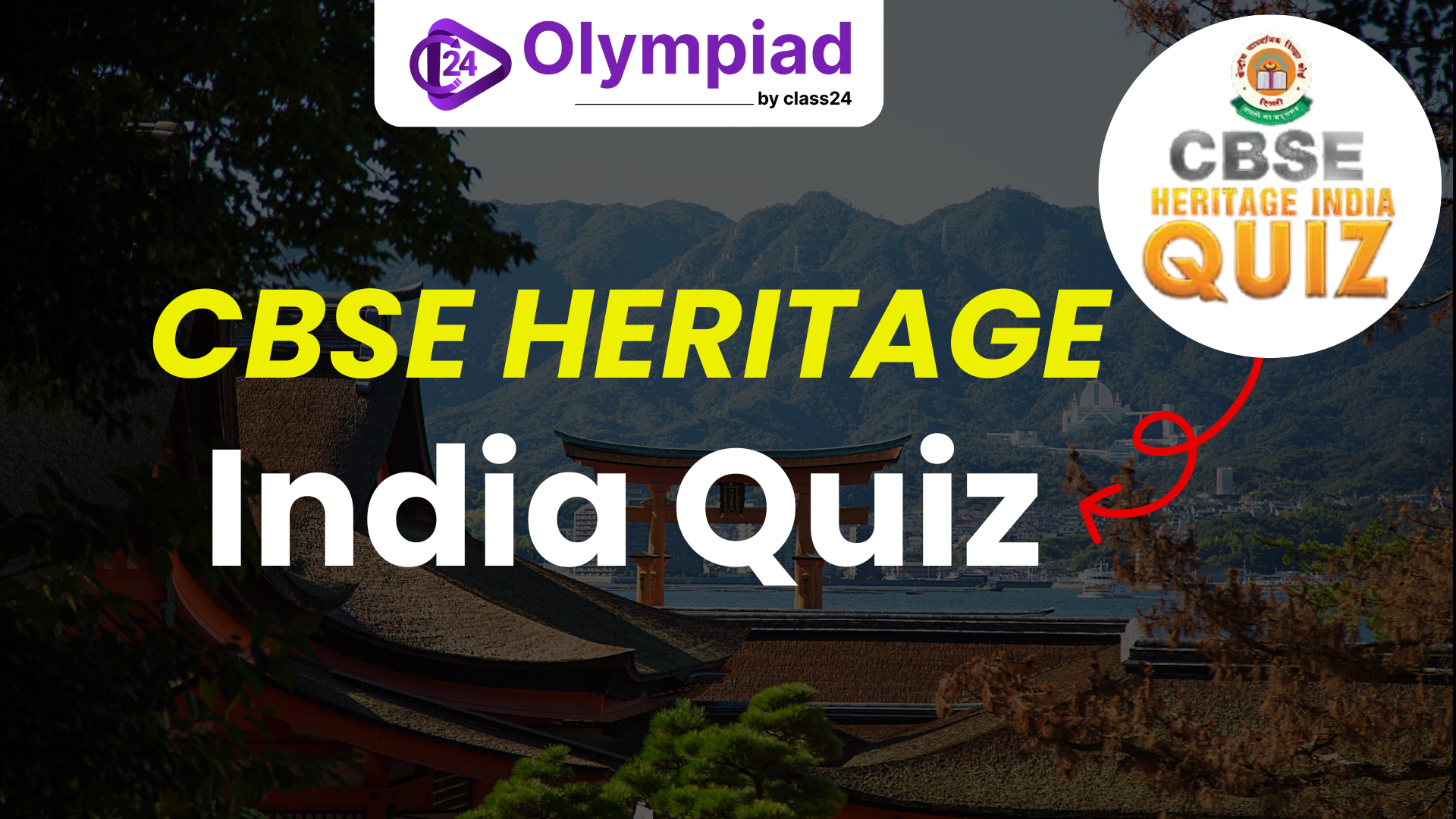
CBSE Heritage India Quiz is introduced for shaping young minds with the knowledge about the culture , heritage and the architectural beauty India has . India has a wealth of culture, history and heritage and the CBSE Heritage India Quiz is a great way to share and champion this with young learners. Organised by CBSE, the quiz guides students to explore and appreciate the cultural, historical and architecture of India. The quiz is intended to get students to explore their heritage and appreciate the many backgrounds found in the country.This quiz is organised for students in different classes each year. This tour helps students gather more knowledge about Indian history, monuments, art, culture and traditions. This blog gives a complete overview of the CBSE Heritage India Quiz, explaining how it works, when to apply, how to prepare, what you can gain and answering common questions.
The CBSE Heritage India Quiz is organised to increase knowledge about India’s cultural and historical heritage. It works to show students the many events from India’s past, starting from the oldest times to the present. Topics explored in the quiz stretch from landmarks and art to key people, customary events and important India events that have influenced the nation.
The main idea behind the quiz is to inspire pride and accountability among people about Indian heritage.
It encourages students to discover the reasons for India’s many customs and traditions.
Because of this, people can better relate to the country’s history.
Indian culture covers many forms and is very diverse.
Monuments such as the Taj Mahal and Qutub Minar are included in the area.
It looks at ancient communities such as the Indus Valley Civilization.
Among the classical dances, Bharatanatyam and Kathak are included in this heritage.
Many Indian festivals are also included in the quiz.
The Heritage India Quiz looks at all of these areas and a range of additional topics.
It teaches students different aspects of India’s legacy.
The quiz is offered to students of classes 6, 7, 8, 9 and 10.
The permitted classes may differ a little each year, according to CBSE guidelines.
CBSE-affiliated schools, as well as a number of other institutions, enter participants into the quiz.
The event is organised for children at all these levels.
Usually, students start band programmes by participating at their school.
With this strategy, students learn to work together.
It helps schools make Indian heritage part of their programmes.
Heritage India Quiz starts with quizzes in schools and then goes on to an overall national contest. This exam uses questions where students choose the answer from a list, answer whether a statement is true or false and also look at images to test their awareness.
|
Round |
Description |
Mode |
Number of Questions |
Duration |
|
School Level |
Initial screening of participants |
Online/Offline |
30 MCQs |
45 minutes |
|
Regional Level |
Selected students compete regionally |
Online |
40 MCQs |
60 minutes |
|
State Level |
Winners from regions compete at state level |
Online |
50 MCQs |
60 minutes |
|
National Level |
Top students from states compete nationally |
Online |
60 MCQs |
90 minutes |
As students advance through the levels, they are presented with questions that cheque both their knowledge and their skill to use it in different cases.
It is very important for students and schools to understand when each quiz will take place.
|
Event |
Tentative Date |
Notes |
|
Registration Opens |
August - September |
Schools register their students online. |
|
Registration Closes |
October (Mid) |
Last date for submitting participants. |
|
School Level Quiz |
October - November |
Conducted at the school or online. |
|
Regional Level Quiz |
November - December |
Winners from school level compete regionally. |
|
State Level Quiz |
December - January |
Qualified students compete at state level. |
|
National Final |
February - March |
Top qualifiers compete for the national title. |
|
Result Announcement |
April |
Results declared on official website. |
To help students at all educational levels, the quiz is scheduled for several months apart. Organisers send information early on so the schools can prepare well.
Online: Schools with the required infrastructure conduct the quiz digitally, which allows for a wider reach and ease of management.
Offline: Schools in areas with limited internet access conduct the quiz in a traditional pen-and-paper format, ensuring inclusivity.
All schools under CBSE can enrol for the quiz using the official CBSE website or the special online platform. Coordinators prepare necessary information on the school and hand in the number of participants.
After students get through the registration process, the school rows them into the programme. Teachers lead students through the registration process to cheque that the details are right and correct.
The approach is, generally, for CBSE to collect a small registration fee from each student or to ask the school to pay as a group. All fee information can be found in the official announcement.
|
Number of Students |
Fee per Student (INR) |
Mode |
|
1-50 |
100 |
Online/Offline |
|
51-100 |
90 |
Online/Offline |
|
101 and above |
80 |
Online/Offline |
Schools usually prepare sessions and share resource materials from CBSE or suggested sources to ready students for the quiz.
Schools usually prepare sessions and share resource materials from CBSE or suggested sources to ready students for the quiz.
Artworks are displayed on the web and participants at every level are rewarded with certificates or trophies. Many times, official ceremonies recognise national winners by awarding them prizes.
Understand the Syllabus:
Make sure to study India’s historical background, cultural practises, landmarks, unique artistic traditions, meaningful festivals and illustrious figures when using CBSE guidelines. Understand the diverse areas within a region to respond to questions regarding each place’s culture.
Use Official Resources:
A lot of the time, CBSE and the websites it works with include study guides and past year’s exam papers. Reliable sources will help you be ready for anything in class.
Read Books and Watch Documentaries:
Books on Indian roots and history are nice to have alongside your regular study materials and documentaries will show you key subjects. A good example is available in documentaries on UNESCO World Heritage Sites in India.
Practice Mock Quizzes:
Practise taking online quizzes designed to help you work faster and with greater accuracy.
Group Discussions:
Have discussions in groups at school to exchange information and solve your questions. Often, these talks bring up interesting information and prompt us to learn more.
Visit Historical Sites:
When you can, go to local history museums or heritage sites to learn about the subject from real exhibit items.
Keep Updated on Current Affairs:
Some questions on the quiz may deal with the latest news in heritage conservation, so it’s helpful to keep up to date.
Educational Growth
Helps you learn more about Indian heritage and culture.
Raises people’s understanding of happenings in the past.
Quiz formats improve your ability to analyse information and make quick decisions.
Supports teaching people to find out information by themselves which helps them grow in their studies.
Personal Development
Improves your confidence and skills at talking in public.
Promotes the practice of research and encourages personal learning.
Helps students interact with peers who come from different regions, to improve their social skills and learn from new cultures.
Builds pride among people in India’s great cultural history.
Recognition and Rewards
Some kinds of official recognition for the competition’s winners.
Often this field hands out prizes or scholarships once in a while.
Formal designation that makes their records more attractive to universities looking at applicants.
CBSE or its partners organise walks through cultural places and heritage sites for our students.
The CBSE Heritage India Quiz encourages students to increase their knowledge about their country’s many traditions. The event works to help participants see their own role in caring for India’s culture and history. Students who take this quiz will learn new things, improve the way they think and be recognised for what they accomplish.They should encourage students to get involved and benefit from all the resources they receive for preparation. Students who try their best and are always eager will succeed in shining a light on India’s wonderful past and popular culture.The CBSE Heritage India Quiz helps build enthusiasm for heritage, so students will value their history and traditions and look forward to a future that values equality.
The content is spot on! It breaks down complex topics into simple, digestible parts. Really helped me understand Rajasthan’s polity and history better. Highly recommended for serious aspirants!
What sets this platform apart is the clarity of explanations and structured study plans. It kept me motivated and on track throughout my prep journey.
Loving the regular updates and current affairs section. Makes revision so easy. The mock tests gave me a real feel of the actual exam!




Leave a Comment